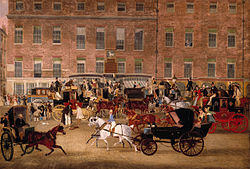| Old White Horse Cellar | |
|---|---|
 The White Horse Cellar, Piccadilly by James Pollard | |
 | |
| General information | |
| Address | 155 Piccadilly |
| Town or city | London |
| Country | England |
| Coordinates | 51°30′26″N 0°08′30″W / 51.50722°N 0.14167°W |
| Construction started | 1720 |
| Demolished | 1884 |
The Old White Horse Cellar (also known as Hatchetts White Horse Cellar) at No. 155 Piccadilly was one of the best-known coaching inns in England during the 18th and 19th centuries.[1] The first mention of the White Horse Cellar is in 1720.[2] It was originally located on the corner of Arlington Street, where the Ritz Hotel is now located.[3] The first landlord, a man named Williams, named it in honor of the newly established House of Hanover, whose heraldic emblem featured a white horse. The White Horse rose to prominence under Abraham Hatchett[4] who later moved it to the opposite side of the road on the corner of Albemarle Street,[3] where it was known as "Hatchett’s Hotel and White Horse Cellar".[4] The precise date of the move is not known, but was precipitated by the construction of the Bath Hotel,[5] which was located on the corner of Piccadilly and Arlington as early as 1798.[6] It was torn down in 1884 to make room for the Albemarle.[3]
In its heyday, the White Horse Cellar was the starting terminus for all western-bound mail coaches from London.[7] Mail bound for Bath and Bristol left the White Horse each night.[8] It had a "travellers' room", a sort of waiting room for travellers to rest and wait for another coach. The room had a fireplace, partitioned sleeping cubbyholes, a clock, a mirror and a waiter who would serve food from the kitchen.[3] But the real draw was the cellar, where people gathered to gossip, discuss the news and share a drink.[4]
Hatchett apparently moved out before the building was demolished, as in 1848 "Hatchett's Hotel and New White Horse Cellar" was operating at 67 & 68 Piccadilly.[9] Mention was made by Edward Mogg in 1838 that both the Old White Horse Cellar and the New White Horse Cellar remained standing nearly opposite each other on Piccadilly.[10] In the 1920s Hatchett published a history of the establishment, Old Coaching Days and the White Horse Cellar Piccadilly established A D 1720.[11]
- ^ Binney, Marcus (1999). The Ritz Hotel (First published in the United Kingdom in 1999. ed.). London: Thames & Hudson. ISBN 978-0-500-51279-1.
- ^ Wheatley, Henry Benjamin (2011). Round About Piccadilly and Pall Mall Or, a Ramble from the Haymarket to Hyde Park. London: Cambridge Univ Pr. p. 39. ISBN 978-1-108-03650-4.
- ^ a b c d Harper, Charles G. (1906). The Old Inns of Old England, Volume I (of 2) A Picturesque Account of the Ancient and Storied Hostelries of Our Own Country. London: Chapman & Hall Limited. pp. 253–254. Retrieved 23 June 2015.
- ^ a b c Harper, Charles G. (1922). The Brighton Road: The Classic Highway to the South (3 ed.). London: C. Tinling & Co., Ltd. pp. 4–5. Retrieved 23 June 2015.
- ^ Wagner, Leopold (1858). More London Inns and Taverns. Newcastle-Upon-Tyne, England: Northumberland Press Limited. p. 110. Retrieved 26 June 2015.
- ^ "Lost". The Times. London, England. 19 December 1789. p. 1. Retrieved 26 June 2015 – via Newspapers.com.

- ^ "Hatchett's Hotel and Coffee House, Piccadilly, London". Look and Learn. 2 September 2013. Retrieved 23 June 2015.
- ^ Harris, Stanley (1882). Old Coaching Days. R. Bentley. pp. 23–23.
- ^ "Inns, Taverns & Beer Houses in London in the 1848 London Post Office Directory". Pubs History. Pubs History. Retrieved 23 June 2015.
- ^ Mogg, Edward (1838). Mogg's New Picture of London; or, Stranger's Guide to the British Metropolis, etc. London: Edward Mogg. p. 81.
- ^ "Old coaching days and the White Horse Cellar, Piccadilly, established A.D. 1720". 1949.